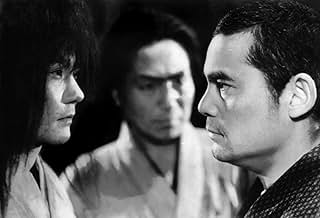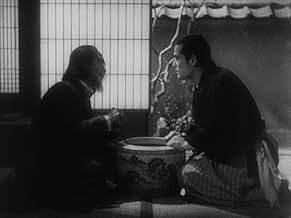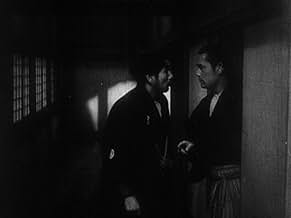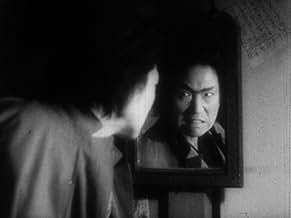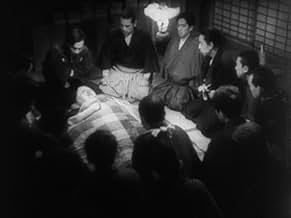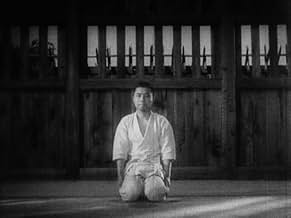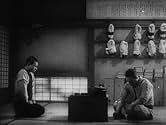IMDb-BEWERTUNG
6,0/10
2949
IHRE BEWERTUNG
Füge eine Handlung in deiner Sprache hinzuSugata returns to prove his judo mastery in a match against Western opponents.Sugata returns to prove his judo mastery in a match against Western opponents.Sugata returns to prove his judo mastery in a match against Western opponents.
- Regie
- Drehbuch
- Hauptbesetzung
Kô Ishida
- Daisuburo Hidarimonji
- (as Ko Ishida)
Osman Yusuf
- American Sailor
- (as Osman Yusef)
Empfohlene Bewertungen
I ended my recent review of "Sanshiro Sugata" by a sneaky remark. I alleged that the lead actor Susumu Fujita was no Toshiro Mifune... and I wish I could have found a more pleasant way to put it.
Now, let me reformulate. As true as it might be that Fujita doesn't have the same range, charisma or 'magnitude' than international icon Mifune, it is as unfair as comparing Harry Carey Jr. To John Wayne. And after that weird and rather corny opening, his appearance was quite a welcome sight. Indeed, something about the first minutes of the sequel of "Sanshiro Siguta" (which I prefer to refer to as "The Legend of the Great Judo") really set me off. The drunken Yankee sailor (played by Osman Yusuf!) kept blabbering some American slang with a rather convincing accent but the rickshaw was playing it it (no pun intended) as if he was playing in a Mac Senntt film.
Fujita's entrance changes the tone. He looks stern, menacing, and oddly intimidating. The confrontation did not leave much for suspense; it was obvious that for his opening fight scene would be an easy win. Still, whatever is wrong with the sequel has nothing to do with Fujita, who delivers a memorable performance as the young, idealistic and well-meaning martial arts student. It is a good thing because Siguta is in such a perpetual self-doubt that his quest could have taken a trilogy. I doubt it would have helped Kurosawa's career and I am sure he was more than glad to change this after the war. Therefore, at the end Siguta reaches his personal nirvana after Kurosawa stretched his arc as far as he could.
For the rest, it takes a while for the film to find its tone as it keeps being entangled in the necessity to make a point about the art of judo's superiority over boxing, the decadent export of US. Apparently Kurosawa was somewhat forced into making the film a propaganda by underlining without any attempt at subtitlity that boxing incarnates a failure of civilization that is so opposed to the quest of Judo... but for that, Americans are barely present and are replaced by a Japanese manager who's a caricatural sellout. While the film is by no means mediocre, it is not the master's finest hour and you can tell that if it wasn't for that propaganda subtext, it could have made for a better experience. It doesn't help that the image and sound quality (obviously not restored) make it difficult to appreciate.
Now the film is slightly better when it makes connections with the previous one and shows Sigita struggling to forgive himself for the death of Yono's father (played by Shimura in the first film) and when all of sudden, two strange long-haired characters who look like coming from a fantasy horror film and with expressionnist shadows decide to come to revenge their brothers, leading to a climax set in the snow-covered mountains. Iy is so magnificent you'd think it was borrowed from another film... and come way too late in the film.
Overall, it is a decent film but, the result is so beneath the standards of excellence of Kurosawa and of intelligence, that it will probably satisfy some history buffs looking for expressions of propaganda Japanese film and naturally the completists. Apart from that, it is a warmup before Toshiro Mifune who was certainly the muse Kurosawa needed (with Shimura being the touchstone)
Now, let me reformulate. As true as it might be that Fujita doesn't have the same range, charisma or 'magnitude' than international icon Mifune, it is as unfair as comparing Harry Carey Jr. To John Wayne. And after that weird and rather corny opening, his appearance was quite a welcome sight. Indeed, something about the first minutes of the sequel of "Sanshiro Siguta" (which I prefer to refer to as "The Legend of the Great Judo") really set me off. The drunken Yankee sailor (played by Osman Yusuf!) kept blabbering some American slang with a rather convincing accent but the rickshaw was playing it it (no pun intended) as if he was playing in a Mac Senntt film.
Fujita's entrance changes the tone. He looks stern, menacing, and oddly intimidating. The confrontation did not leave much for suspense; it was obvious that for his opening fight scene would be an easy win. Still, whatever is wrong with the sequel has nothing to do with Fujita, who delivers a memorable performance as the young, idealistic and well-meaning martial arts student. It is a good thing because Siguta is in such a perpetual self-doubt that his quest could have taken a trilogy. I doubt it would have helped Kurosawa's career and I am sure he was more than glad to change this after the war. Therefore, at the end Siguta reaches his personal nirvana after Kurosawa stretched his arc as far as he could.
For the rest, it takes a while for the film to find its tone as it keeps being entangled in the necessity to make a point about the art of judo's superiority over boxing, the decadent export of US. Apparently Kurosawa was somewhat forced into making the film a propaganda by underlining without any attempt at subtitlity that boxing incarnates a failure of civilization that is so opposed to the quest of Judo... but for that, Americans are barely present and are replaced by a Japanese manager who's a caricatural sellout. While the film is by no means mediocre, it is not the master's finest hour and you can tell that if it wasn't for that propaganda subtext, it could have made for a better experience. It doesn't help that the image and sound quality (obviously not restored) make it difficult to appreciate.
Now the film is slightly better when it makes connections with the previous one and shows Sigita struggling to forgive himself for the death of Yono's father (played by Shimura in the first film) and when all of sudden, two strange long-haired characters who look like coming from a fantasy horror film and with expressionnist shadows decide to come to revenge their brothers, leading to a climax set in the snow-covered mountains. Iy is so magnificent you'd think it was borrowed from another film... and come way too late in the film.
Overall, it is a decent film but, the result is so beneath the standards of excellence of Kurosawa and of intelligence, that it will probably satisfy some history buffs looking for expressions of propaganda Japanese film and naturally the completists. Apart from that, it is a warmup before Toshiro Mifune who was certainly the muse Kurosawa needed (with Shimura being the touchstone)
Akira Kurosawa's third film, released a year after The Most Beautiful (which he made for his wife) (actually, if it weren't for the lousy search function of Douban, there'd be no need to repeat this sort of objective reality in a review).
Akira Kurosawa himself, in his autobiography "Toad's Oil", doesn't seem to recognize much of the cinematic value of this "sequel to Zizan Sanshiro", which coincides with the popular aesthetic, the biggest criticism being the lyrical patriotism, similar to that in the modern-day Ip Man, an element that was loathed in the movies 60 years ago, and is still the case 60 years later. It's just obvious that the director, who has influenced Western cinema many times over in terms of casting and dramatization, naturally has his own insights. In the "Zi San Shiro sequel" will rarely see so involved, Kurosawa has shot, so low mobilization of nerves of film and television subject matter, at this point, I think the domestic film and television industry is still worth looking back at history to learn.
But the master is a master, after all, in the "Zi San Shiro sequel" we did not see colorful on that bad bridge too much continuation, but is point to the end, in the end oriented to the benevolence of the evil of revenge on the ending. It's as if when countless critics were giddy as if they were watching this talented Japanese director have some cracks in him, Akira Kurosawa once again backtracked on the theme of human kindness so that his early style wouldn't be so clearly labeled as patriotic.
Even now, as a director who has just made two movies, in his early work has revealed extremely artistic light and composition, in dealing with multiple people standing, not only makes people wonder if Antonioni has come here to steal the division.
Akira Kurosawa himself, in his autobiography "Toad's Oil", doesn't seem to recognize much of the cinematic value of this "sequel to Zizan Sanshiro", which coincides with the popular aesthetic, the biggest criticism being the lyrical patriotism, similar to that in the modern-day Ip Man, an element that was loathed in the movies 60 years ago, and is still the case 60 years later. It's just obvious that the director, who has influenced Western cinema many times over in terms of casting and dramatization, naturally has his own insights. In the "Zi San Shiro sequel" will rarely see so involved, Kurosawa has shot, so low mobilization of nerves of film and television subject matter, at this point, I think the domestic film and television industry is still worth looking back at history to learn.
But the master is a master, after all, in the "Zi San Shiro sequel" we did not see colorful on that bad bridge too much continuation, but is point to the end, in the end oriented to the benevolence of the evil of revenge on the ending. It's as if when countless critics were giddy as if they were watching this talented Japanese director have some cracks in him, Akira Kurosawa once again backtracked on the theme of human kindness so that his early style wouldn't be so clearly labeled as patriotic.
Even now, as a director who has just made two movies, in his early work has revealed extremely artistic light and composition, in dealing with multiple people standing, not only makes people wonder if Antonioni has come here to steal the division.
I have seen every Akira Kurosawa movie available on VHS or DVD and this is the first "bad" one among them. In fact, I will be so bold as to say I doubt he really directed it. His name is on the credits but I don't see a shred of him in the work. No environmentally framed shots, no contrasts of light and dark, no horizon dividing the frames. He must have done this one with a week of shooting time or a budget of 50 Yen. The comical fight between the Judo stylist and Karate stylist literally made me laugh out loud. It looked like parody. Nothing like the climatic fight in the first Sugata Sanshiro. Also the subtitles were apparently done by someone in China who could speak a little Japanese and a little English. They use the word "karate" for both karate and judo, and since the main conflict is between the two styles, you'd better pay attention to who's doing the the talking or you'll never follow the plot. The movie just about "braked" me.
I saw the Kurosawa's first film, Sugata Sanshiro (1943), many years ago and was much impressed by the story and the spirit of martial arts, thus portrayed. It wasn't my introduction to Kurosawa, however, having already seen Seven Samurai (1954) and Yojimbo (1961).
Now, having seen the sequel to Sugata Sanshiro, one thing is certain: full appreciation for the story within the first film and this sequel is only possible, in my opinion, if you are, in fact, a practitioner of martial arts also which I am, and have been for thirty years. Note that I'm not excluding appreciation of Kurosawa's skill as a director; that's something that everyone can recognize and applaud. Even with these early films, Kurosawa's trademarks are clear: long silences, tightly framed sets where action moves across and around it, long close-ups of faces, objects and such like, much face-to-face dialog, and music that is generally muted.
This sequel is ostensibly about Japanese-American relationships in 1887, when Sugata is finally seduced into a match-up between himself and an American boxing champion. The film was made in 1945, soon after the Japanese surrender. Hence, the reason for that part of the story line is clear: even in the defeat of war, the Japanese martial spirit remains supreme. It is an understandable need on the part of Japan, and Kurosawa, at that time.
However, Kurosawa, and others involved no doubt, must have realized that there was a problem: the essence of martial arts is defense, not offense. So, it's entirely uncharacteristic for a true martial arts student to actively search out a contest that he knows has usually one outcome only: death for one of the competitors. Hence, Sugata must be shown as weak and indecisive at first so that he falls from grace, in his own eyes, when he defeats the American, who, fortunately, is not killed.
Sugata's salvation, however, as a true follower of the martial way, only comes when he meets the challenge of a karate champion in a fight to the death, during a winter storm on the side of a mountain. That fight scene is so realistic it's almost sublime: Kurosawa has captured exactly how two indomitable spirits stand and wait for the other to make the first move because the first mistake means death for one of them. Instead, the elements defeat both of them, with the karate master falling down a steep incline when Sugata tosses him over his shoulder. Honor for both, however, is assuaged: they spend the night in a hut together, where both recover from their efforts while the karate master's brother keeps watch.
There's a crucial sub-plot with that brother that I'll leave you to discover because it's a turning point in Sugata's life that actually saves him from death. See this and you'll know why. And savor that final scene when Sugata wakes from his sleep to face a new day and, for him, a new beginning as a judo ka (judo student) and as human being. It's pure Kurosawa as only he could do...
My only puzzlement with this story is the presence of karate students and practitioners in Japan in the 19th century. From the history I've read, karate was introduced into Japan only in 1922 when Funakoshi Gichin of Okinawa was invited to provide a demonstration in Tokyo. However, I'll bow to Kurosawa's better knowledge about his own country and society.
If you practice martial arts, you should enjoy this film. If you're curious, I'd recommend you try to see both.
Now, having seen the sequel to Sugata Sanshiro, one thing is certain: full appreciation for the story within the first film and this sequel is only possible, in my opinion, if you are, in fact, a practitioner of martial arts also which I am, and have been for thirty years. Note that I'm not excluding appreciation of Kurosawa's skill as a director; that's something that everyone can recognize and applaud. Even with these early films, Kurosawa's trademarks are clear: long silences, tightly framed sets where action moves across and around it, long close-ups of faces, objects and such like, much face-to-face dialog, and music that is generally muted.
This sequel is ostensibly about Japanese-American relationships in 1887, when Sugata is finally seduced into a match-up between himself and an American boxing champion. The film was made in 1945, soon after the Japanese surrender. Hence, the reason for that part of the story line is clear: even in the defeat of war, the Japanese martial spirit remains supreme. It is an understandable need on the part of Japan, and Kurosawa, at that time.
However, Kurosawa, and others involved no doubt, must have realized that there was a problem: the essence of martial arts is defense, not offense. So, it's entirely uncharacteristic for a true martial arts student to actively search out a contest that he knows has usually one outcome only: death for one of the competitors. Hence, Sugata must be shown as weak and indecisive at first so that he falls from grace, in his own eyes, when he defeats the American, who, fortunately, is not killed.
Sugata's salvation, however, as a true follower of the martial way, only comes when he meets the challenge of a karate champion in a fight to the death, during a winter storm on the side of a mountain. That fight scene is so realistic it's almost sublime: Kurosawa has captured exactly how two indomitable spirits stand and wait for the other to make the first move because the first mistake means death for one of them. Instead, the elements defeat both of them, with the karate master falling down a steep incline when Sugata tosses him over his shoulder. Honor for both, however, is assuaged: they spend the night in a hut together, where both recover from their efforts while the karate master's brother keeps watch.
There's a crucial sub-plot with that brother that I'll leave you to discover because it's a turning point in Sugata's life that actually saves him from death. See this and you'll know why. And savor that final scene when Sugata wakes from his sleep to face a new day and, for him, a new beginning as a judo ka (judo student) and as human being. It's pure Kurosawa as only he could do...
My only puzzlement with this story is the presence of karate students and practitioners in Japan in the 19th century. From the history I've read, karate was introduced into Japan only in 1922 when Funakoshi Gichin of Okinawa was invited to provide a demonstration in Tokyo. However, I'll bow to Kurosawa's better knowledge about his own country and society.
If you practice martial arts, you should enjoy this film. If you're curious, I'd recommend you try to see both.
The martial arts are so dominant in Asian cultures. Kurosawa uses them in most of his films. This is the sequel to his first film, starring the same actor and character. It is rather talky. For some reason there are American sailors all over the place (I haven't had the time to investigate why so many were there in the time period shown). They have brought their great boxer, I suppose, to make them look idiotic, using fighting for profit rather than as a spiritual endeavor. Sugata is a folk hero and carries a lot of weight. When he sees a fellow martial arts expert beaten to a pulp, he feels he must do something to bring respect. Along the way, he becomes so famous (like a successful gunfighter) that the negative element wants a piece of him. There is just something lacking in this and is not the best Kurosawa (although he certainly was learning).
Wusstest du schon
- WissenswertesThe final fight scene was filmed outdoors in real snow. Susumu Fujita, fighting barefoot, had to be carried to a bonfire between each shot as his feet would go numb.
- VerbindungenFollows Die Legende vom großen Judo (1943)
Top-Auswahl
Melde dich zum Bewerten an und greife auf die Watchlist für personalisierte Empfehlungen zu.
- How long is Sanshiro Sugata, Part Two?Powered by Alexa
Details
- Erscheinungsdatum
- Herkunftsland
- Sprache
- Auch bekannt als
- Sanshiro Sugata, Part Two
- Drehorte
- Toho Studios, Tokio, Japan(Studio)
- Produktionsfirma
- Weitere beteiligte Unternehmen bei IMDbPro anzeigen
- Laufzeit1 Stunde 23 Minuten
- Farbe
- Sound-Mix
- Seitenverhältnis
- 1.37 : 1
Zu dieser Seite beitragen
Bearbeitung vorschlagen oder fehlenden Inhalt hinzufügen

